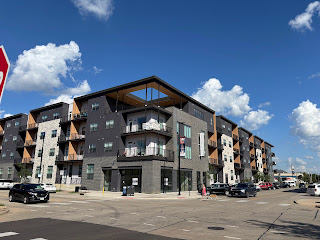 |
| Is a casino what this block needs? |
Of the three I prefer the look of Wild Rose's proposal. It's an unpretentious building that works well with the rest of the block and doesn't impede walkability. My main beefs against the original Cedar Crossing proposal were that it was a gaudy building that wouldn't work with the street; that it was a self-contained pod of attractions that not only would provide no spillover benefits to nearby businesses but would actively compete against them; and that, compared to a contemporaneous proposal by MGM to Springfield, Massachusetts, the City of Cedar Rapids seemed to be getting very little out of the deal. I haven't seen the financial details of the current proposals, so can't compare them or assess their sufficiency.
I remain curious as to why a casino plays such a central role in our city's discussions of economic development. Some people enjoy them, some don't; I get that. And whether big- or modestly-sized, a new casino will make a noticeable splash when it opens. But as economic drivers casinos seem less effective than incremental urbanism. This admittedly is a pretty slap-dash way of demonstrating this, but let's look at the 400 block of 1st Avenue SE, where the Wild Rose hopes to build. The venerable Bever building, built in 1923, is pretty, but this is far from the hoppin'-est block in town. Using the Urban Three model of property tax comparison...
| NAME | ADDRESS | CITY | CTY | LAND VALUE | IMPROVE MENT VALUE |
TOTAL TAX VALUE | ACRES | VALUE PER ACRE | |||
| Albert Auto | 421 1st Av SE | Cedar Rapids | Linn | 154,600 | 155,800 | 310,400 | 0.296 | 1,048,649 | |||
| Bever Bldg |
417 1st Av SE | Cedar Rapids | Linn | 80,600 | 549,400 | 630,000 | 0.154 | 4,090,909 | |||
| Skogman Bldg |
411 1st Av SE | Cedar Rapids | Linn | 168,000 | 860,000 | 1,028,000 | 0.321 | 3,202,492 | |||
| Vacant Land | Cedar Rapids | Linn | 100,800 | 6,700 | 107,500 | 0.193 | 556,994 | ||||
| TOTAL BLOCK | 504,000 | 1,571,900 | 2,075,900 | 0.964 | 2,153,423 | ||||||
| Wild Rose Casino | 777 Wild Rose Dr | Clinton | Clinton | 2,935,000 | 21,065,000 | 24,000,000 | 28.6 | 839,161 | |||
| Riverside Casino & Golf Resort | 3184 Hwy 22 | Riverside | Wash ington |
5,343,500 | 65,930,100 | 71,273,600 | 381.23 | 186,957 | |||
...we find that the taxable value per acre on this block vastly exceeds either of the region's most successful casinos. The taxable value per acre of the vacant lot where Wild Rose hopes to build is more than three times that of the Riverside Casino and Golf Resort!
However, as dubious a use of valuable real estate as I believe a downtown casino to be, I am done with the Iowa Racing and Gaming Commission. I would rather have the city make its own decisions, even if I disagree with them, about its future. The State of Iowa has shown an unbridled willingness to intervene in and overrule local decisions--from casino location to minimum wage to labor agreements to plastic bags to rental regulations, and now taking down the Des Moines Water Works--without any notable talent for doing it. Unless someone's rights are being violated, the governor and legislature should butt out. We can handle this. Do something you're good at, like ensuring gun rights for robots.
SOURCES
B.A. Morelli, "3 Cedar Rapids Casino Choices Meet Application Deadline," Cedar Rapids Gazette, 13 February 2017
Strong Towns, "The Walmart Index: Results of Our Big Box Data Collection Are In," Strong Towns, 3 August 2016
"G.O.P. Statehouse Shows the Locals Who's Boss," New York Times, 21 February 2017, A22
SEE ALSO:
Ben Seigel and Brooks Rainwater, "Preemption Prevents Innovation," US News and World Report,
"Value Capture and the Property Tax," Lincoln Institute of Land Policy, n.d.
EARLIER POSTS:
"No CR Casino... Now, What?" 17 April 2014
"Their Casino, Our Casino," 5 September 2013
















